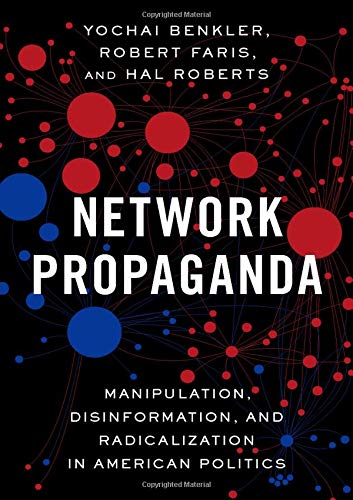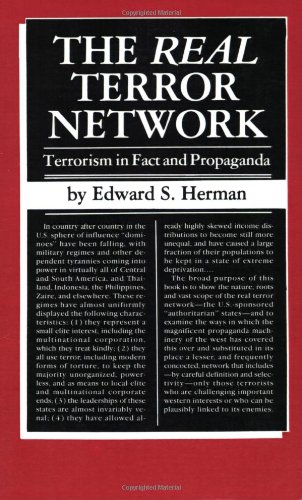The 9 best network propaganda for 2019
Finding the best network propaganda suitable for your needs isnt easy. With hundreds of choices can distract you. Knowing whats bad and whats good can be something of a minefield. In this article, weve done the hard work for you.
Best network propaganda
1. Network Propaganda: Manipulation, Disinformation, and Radicalization in American Politics
Description
This is an open access title available under the terms of a CC BY-NC-ND 4.0 International licence. It is free to read at Oxford Scholarship Online and offered as a free PDF download from OUP and selected open access locations.Is social media destroying democracy? Are Russian propaganda or "Fake news" entrepreneurs on Facebook undermining our sense of a shared reality? A conventional wisdom has emerged since the election of Donald Trump in 2016 that new technologies and their manipulation by foreign actors played a decisive role in his victory and are responsible for the sense of a "post-truth" moment in which disinformation and propaganda thrives.
Network Propaganda challenges that received wisdom through the most comprehensive study yet published on media coverage of American presidential politics from the start of the election cycle in April 2015 to the one year anniversary of the Trump presidency. Analysing millions of news stories together with Twitter and Facebook shares, broadcast television and YouTube, the book provides a comprehensive overview of the architecture of contemporary American political communications. Through data analysis and detailed qualitative case studies of coverage of immigration, Clinton scandals, and the Trump Russia investigation, the book finds that the right-wing media ecosystem operates fundamentally differently than the rest of the media environment.
The authors argue that longstanding institutional, political, and cultural patterns in American politics interacted with technological change since the 1970s to create a propaganda feedback loop in American conservative media. This dynamic has marginalized centre-right media and politicians, radicalized the right wing ecosystem, and rendered it susceptible to propaganda efforts, foreign and domestic. For readers outside the United States, the book offers a new perspective and methods for diagnosing the sources of, and potential solutions for, the perceived global crisis of democratic politics.
2. Computational Propaganda: Political Parties, Politicians, and Political Manipulation on Social Media (Oxford Studies in Digital Politics)
Description
Social media platforms do not just circulate political ideas, they support manipulative disinformation campaigns. While some of these disinformation campaigns are carried out directly by individuals, most are waged by software, commonly known as bots, programmed to perform simple, repetitive, robotic tasks. Some social media bots collect and distribute legitimate information, while others communicate with and harass people, manipulate trending algorithms, and inundate systems with spam. Campaigns made up of bots, fake accounts, and trolls can be coordinated by one person, or a small group of people, to give the illusion of large-scale consensus. Some political regimes use political bots to silence opponents and to push official state messaging, to sway the vote during elections, and to defame critics, human rights defenders, civil society groups, and journalists. This book argues that such automation and platform manipulation, amounts to a new political communications mechanism that Samuel Woolley and Philip N. Noward call "computational propaganda." This differs from older styles of propaganda in that it uses algorithms, automation, and human curation to purposefully distribute misleading information over social media networks while it actively learns from and mimicks real people so as to manipulate public opinion across a diverse range of platforms and device networks. This book includes cases of computational propaganda from nine countries (both democratic and authoritarian) and four continents (North and South America, Europe, and Asia), covering propaganda efforts over a wide array of social media platforms and usage in different types of political processes (elections, referenda, and during political crises).3. The Real Terror Network: Terrorism in Fact and Propaganda
Feature
Used Book in Good ConditionDescription
4. The Misinformation Age: How False Beliefs Spread
Description
Why should we care about having true beliefs? And why do demonstrably false beliefs persist and spread despite bad, even fatal, consequences for the people who hold them?
Philosophers of science Cailin OConnor and James Weatherall argue that social factors, rather than individual psychology, are whats essential to understanding the spread and persistence of false beliefs. It might seem that theres an obvious reason that true beliefs matter: false beliefs will hurt you. But if thats right, then why is it (apparently) irrelevant to many people whether they believe true things or not?
The Misinformation Age, written for a political era riven by fake news, alternative facts, and disputes over the validity of everything from climate change to the size of inauguration crowds, shows convincingly that what you believe depends on who you know. If social forces explain the persistence of false belief, we must understand how those forces work in order to fight misinformation effectively.
5. The Fox Effect: How Roger Ailes Turned a Network into a Propaganda Machine
Description
Here is comprehensive overview of the tumultuous career of former Fox News president Roger Ailes and a must-read for anyone looking to understand his legacy and impact on news media.Based on the meticulous research of the news watchdog organization Media Matters for America, David Brock and Ari Rabin-Havt show how Fox News, under its president Roger Ailes, changed from a right-leaning news network into a partisan advocate for the Republican Party.
The Fox Effect follows the career of Ailes from his early work as a television producer and media consultant for Richard Nixon, Ronald Reagan, and George H. W. Bush. Consequently, when he was hired in 1996 as the president of Rupert Murdochs flagship conservative cable news network, Ailes had little journalism experience, but brought to the job the mindset of a political operative. As Brock and Rabin-Havt demonstrate through numerous examples, Ailes used his extraordinary power and influence to spread a partisan political agenda that is at odds with long-established, widely held standards of fairness and objectivity in news reporting.
Featuring transcripts of leaked audio and memos from Fox News reporters and executives, The Fox Effect is a damning indictment of how the networks news coverage and commentators have biased reporting, drummed up marginal stories, and even consciously manipulated established facts in their efforts to attack the Obama administration.
6. Kompromat: How Russia Undermined American Democracy
Description
A timely and essential book from the CBS correspondent who has led their coverage of Russia election interference and the FBI counterintelligence investigation into whether the Trump Campaign coordinated with the Russians.In this compelling account of how the Russians hacked the 2016 election, CBS News Justice and Homeland Security Correspondent Jeff Pegues reveals how far the Kremlin poked into voter databases and why it happened. He also investigates the steps taken to shore up election systems in states across the country ahead of the 2018 midterm and indeed the 2020 Presidential election.
Based on exclusive interviews with officials from the FBI, Department of Homeland Security, and cybersecurity experts, Pegues takes readers behind the scenes and into the minds of investigators following the case. He delves into the shadowy world of Russian spies, unraveling the complicated web of contacts between Russian operatives and Trump representatives during the campaign. In one chapter, he focuses on Valeri Gerasimov, widely believed to be the mastermind behind a Russian cyber strategy designed to influence and disrupt democracies. Evidence is presented showing that the Russians infiltrated not only Democratic Party computer networks in the US, but networks in the Ukraine and Europe as well.
Consulting with representatives of top cyber security firms, the author discusses what states are doing to protect voting systems in the next midterm elections and beyond.
Fascinating and chilling at the same time, Kompromat opens a window into the murky world of espionage, digital warfare, and a newly aggressive Russia brazenly inserting itself into U.S. politics.
7. The Wealth of Networks: How Social Production Transforms Markets and Freedom
Feature
Yale University PressDescription
With the radical changes in information production that the Internet has introduced, we stand at an important moment of transition, says Yochai Benkler in this thought-provoking book. The phenomenon he describes as social production is reshaping markets, while at the same time offering new opportunities to enhance individual freedom, cultural diversity, political discourse, and justice. But these results are by no means inevitable: a systematic campaign to protect the entrenched industrial information economy of the last century threatens the promise of todays emerging networked information environment.
In this comprehensive social theory of the Internet and the networked information economy, Benkler describes how patterns of information, knowledge, and cultural production are changingand shows that the way information and knowledge are made available can either limit or enlarge the ways people can create and express themselves. He describes the range of legal and policy choices that confront us and maintains that there is much to be gainedor lostby the decisions we make today.
8. The Fox Effect: How Roger Ailes Turned a Network into a Propaganda Machine by David Brock (2012-02-21)
9. Trust Me, I'm Lying: Confessions of a Media Manipulator
Feature
PortfolioDescription
The cult classic that predicted the rise of fake newsrevised and updated for the post-Trump, post-Gawker age.Hailed as "astonishing and disturbing" by the Financial Times and "essential reading" by TechCrunch at its original publication, former American Apparel marketing director Ryan Holidays first book sounded a prescient alarm about the dangers of fake news. It's all the more relevant today.
Trust Me, Im Lyingwas the first book to blow the lid off the speed and force at which rumors travel onlineand get "traded up" the media ecosystem until they become real headlines and generate real responses in the real world. The culprit? Marketers and professional media manipulators, encouraged by the toxic economics of the news business.
Whenever you see a malicious online rumor costs a company millions, politically motivated fake news driving elections, a product or celebrity zooming from total obscurity to viral sensation, or anonymously sourced articles becoming national conversation, someone is behind it. Often someone like Ryan Holiday.
As he explains, I wrote this book to explain how media manipulators work, how to spot their fingerprints, how to fight them, and how (if you must) to emulate their tactics. Why am I giving away these secrets? Because Im tired of a world where trolls hijack debates, marketers help write the news, opinion masquerades as fact, algorithms drive everything to extremes, and no one is accountable for any of it. Im pulling back the curtain because its time the public understands how things really work. What you choose to do with this information is up to you.












Recent Comments